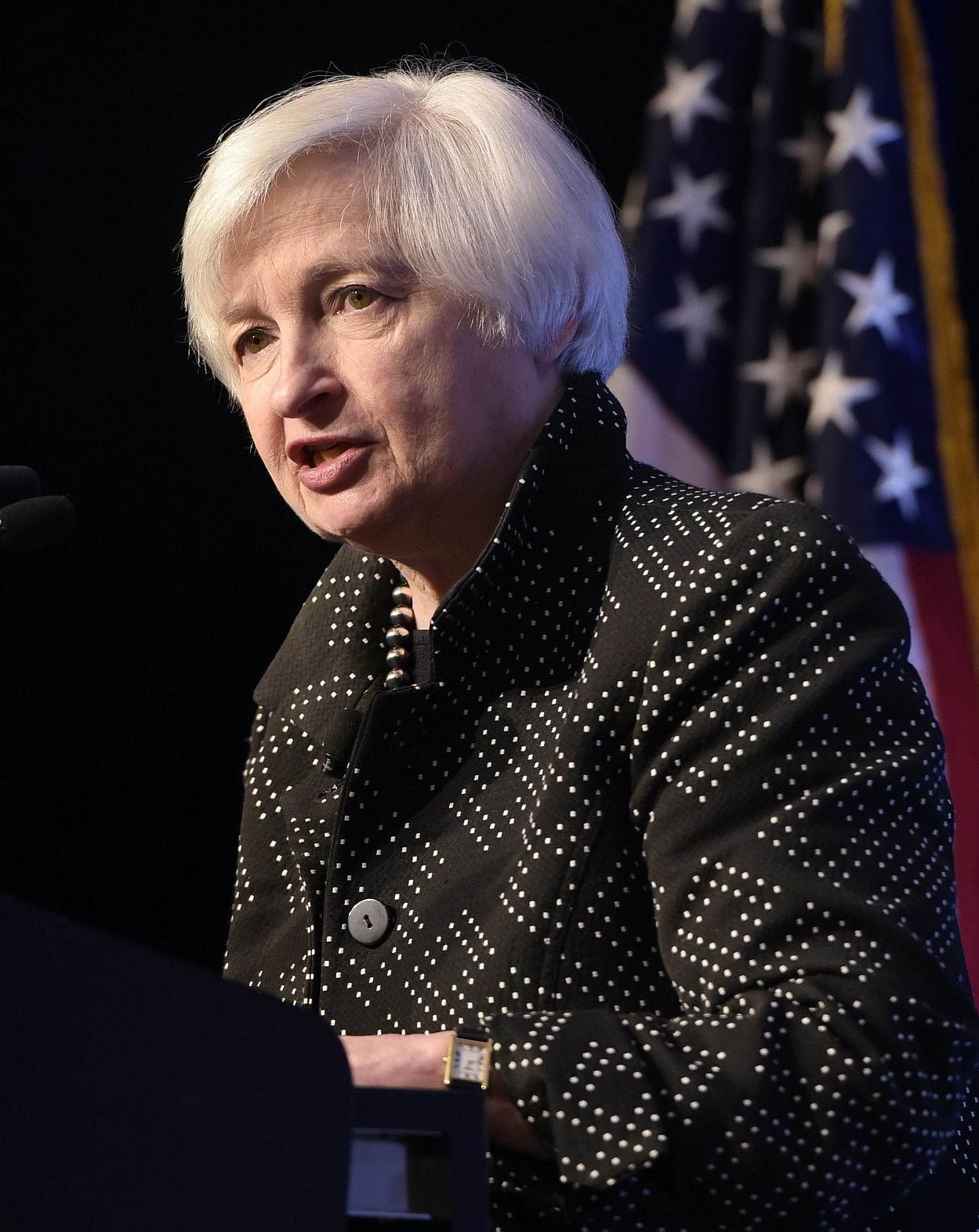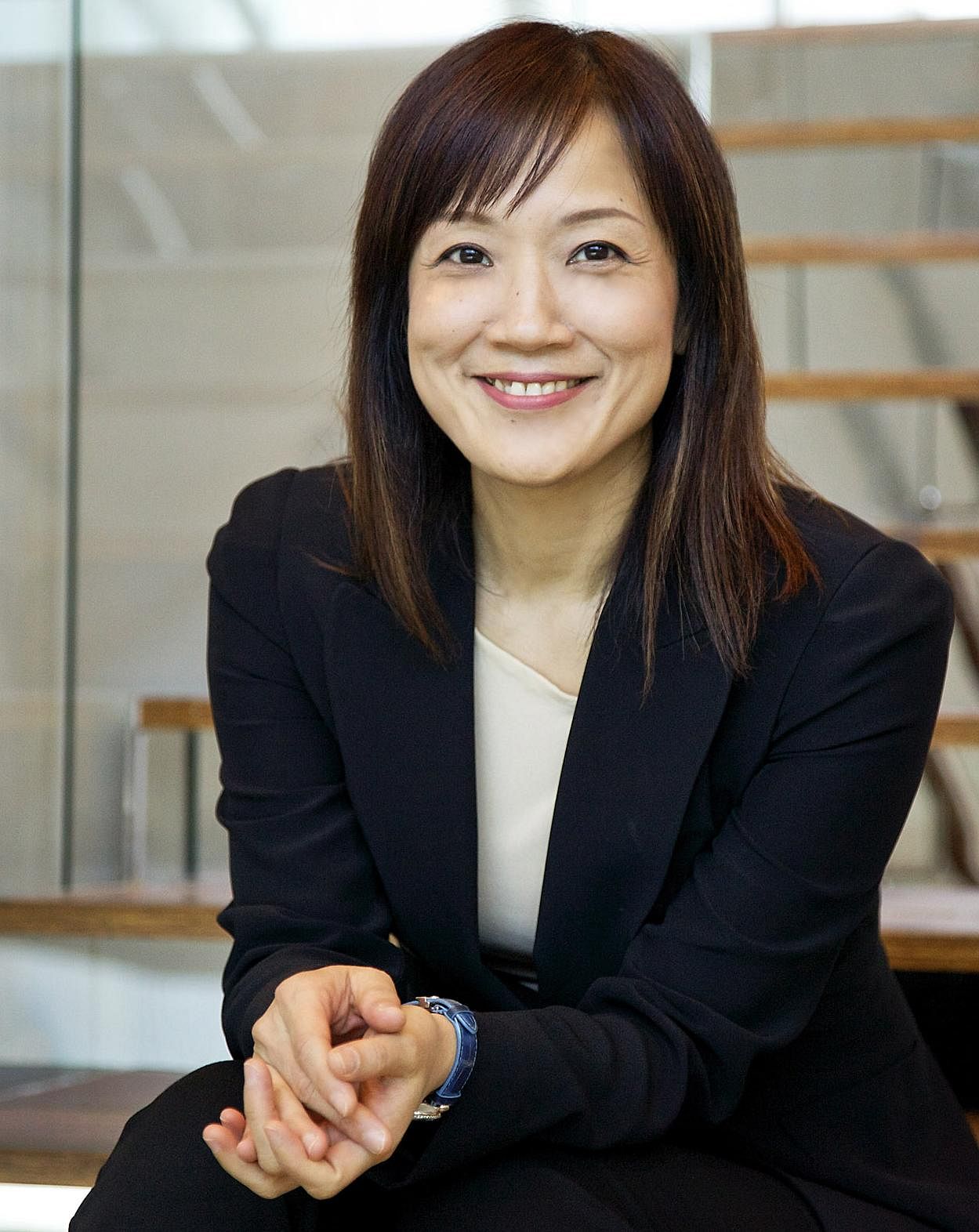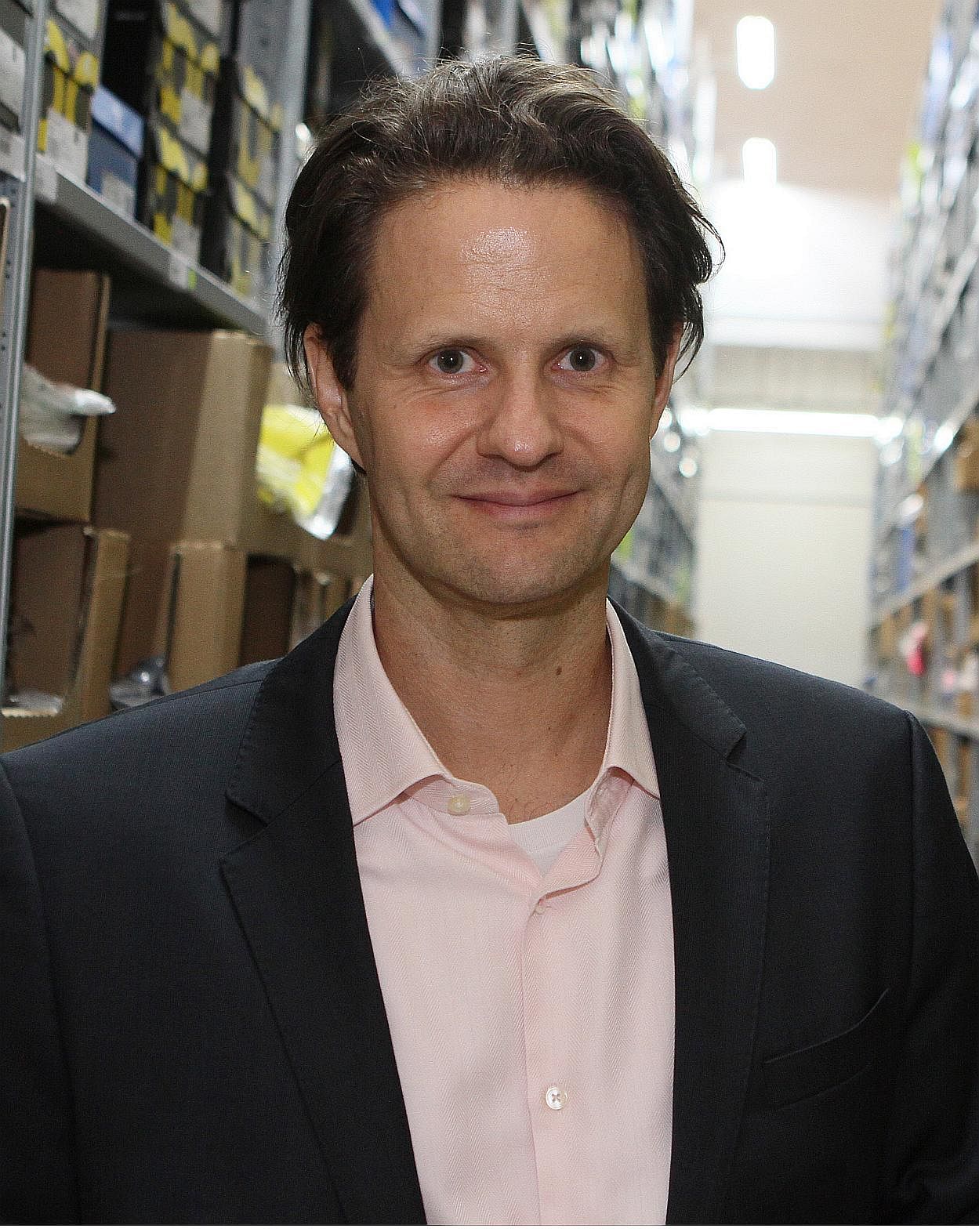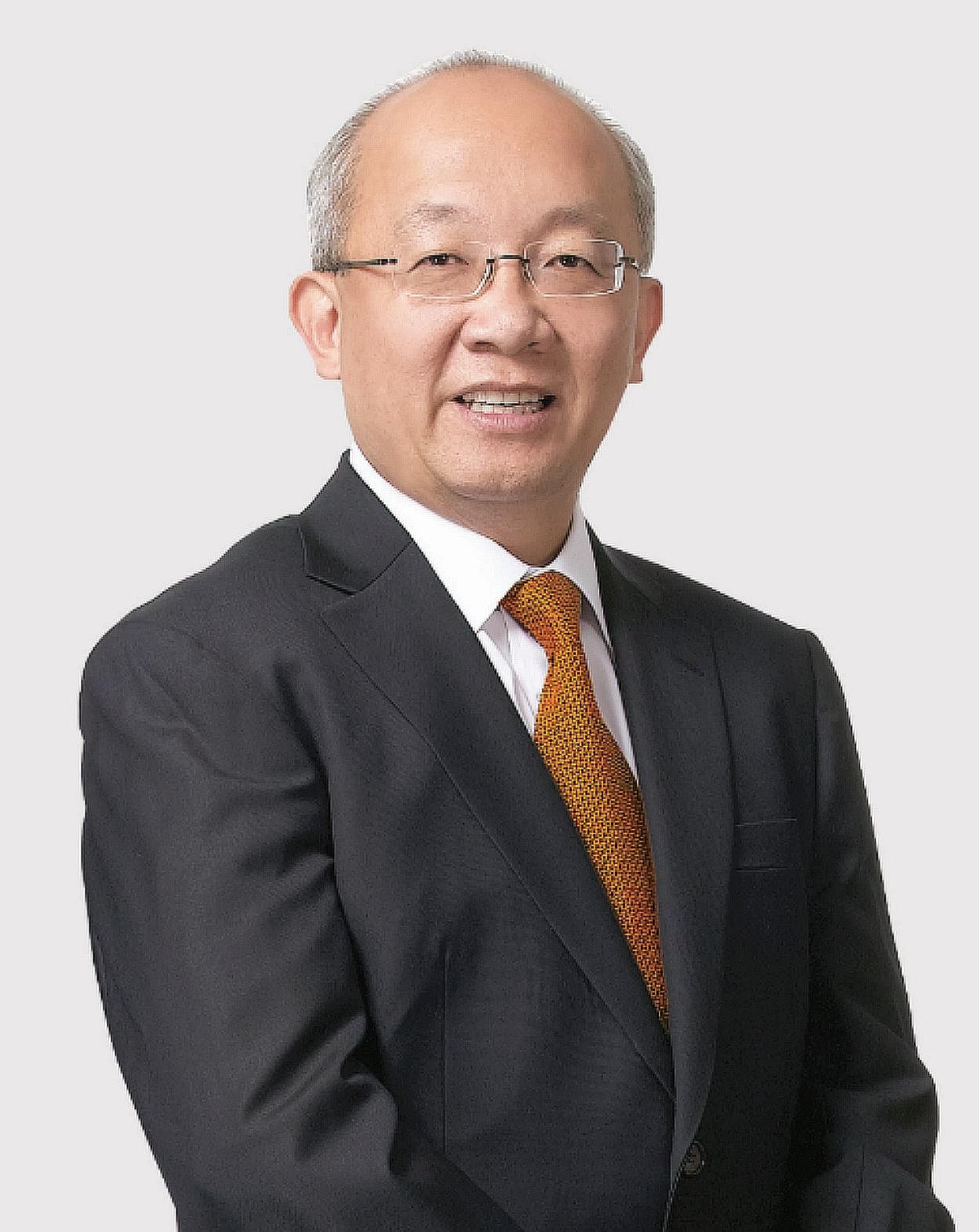1 Keeping markets calm despite rate hike
JANET YELLEN
FEDERAL RESERVE CHAIRMAN

When it came to influencing how financial markets behaved this year, nobody was more powerful than Federal Reserve chair Janet Yellen.
Each time she made a speech, pundits the world over would pore over every word to decipher any possible hidden meaning.
Dr Yellen, an academic who spent nearly two decades teaching at the University of California at Berkeley, learnt early on about the power she held and took on a cautious stance, both in policy and speech.
In the run-up to the Fed's key meeting in mid-December, she dropped plenty of hints beforehand that interest rates would rise - but gently, slowly, so that markets would not panic. And it worked.
When Dr Yellen announced on Dec 16 that the Fed was raising interest rates for the first time in almost a decade, by a quarter of a percentage point, markets were calm.
Emerging market shares, which had been battered by past speculation over the Fed lift-off, even rallied after the move.
Like any person in a position of power, Dr Yellen is not without her critics, including some within the Fed itself.
In October, notably, political activist Ralph Nader issued an open letter to Dr Yellen criticising her low interest rate policy and advising her to "sit down with your Nobel Prize-winning husband, economist George Akerlof".
Unruffled as always, Dr Yellen calmly replied, arguing why low interest rates have helped the US economy, making no mention of Mr Nader's sexist remark.
2 In the eye of the storm

JUDY HSU
STANCHART CEO
Standard Chartered Singapore's new chief executive has taken over the reins at a critical juncture.
Since her appointment became effective in October, the British lender has announced a major restructuring plan that will involve axing 15,000 jobs globally and raising US$5.1 billion (S$7.2 billion) in capital. But the former head of StanChart's global wealth management has the poise and experience to ride through the storm.
With a career spanning over 25 years in the financial industry, including the last 16 years in wealth management, retail banking and private banking, Ms Hsu is no rookie. In fact, StanChart Singapore is well placed to grow its business here.
In a statement to The Straits Times last month, she noted that StanChart's franchise in Singapore remains profitable, with a disciplined balance sheet and well-managed costs.
"We continue to be the second-largest contributor to the group and a major driver of the performance in Asean and South Asia. We have a long history of banking the growing and internationalising companies in our markets," Ms Hsu said.
"We remain committed to Singapore, and we are going to build on those strengths across our network."
StanChart will also sharpen its focus on enhancing its retail banking and private banking, expanding its wealth management platform and building on its leadership in the digital banking space.
"We will continue to invest into strategic opportunities where we see a competitive advantage and where we can grow with less capital."
Ms Hsu has already made senior management changes in Singapore, most notably appointing new heads for the bank's retail, transaction and commercial banking divisions.
3 An agent of change

LOH BOON CHYE
SGX CHIEF
When the veteran banker took on the role of Singapore Exchange's (SGX) chief executive in July, he surely knew what a big job awaited him.
The SGX has not only been hit by technological mishaps in the past couple of years, but is also suffering from market malaise, with trading activity this year slowing to a trickle amid a turbulent global economic backdrop and constant guessing over when the United States Federal Reserve would raise interest rates.
But Mr Loh, 51, is no stranger to the SGX - he was a director from 2003 to 2012 and his 26 years in the financial services industry would have left him in good stead to steer the bourse into next year and beyond. Mr David Gerald, president and chief executive of the Securities Investors Association (Singapore), said it is "particularly pleased to see the SGX board appointing a Singaporean to succeed Mr (Magnus) Bocker", a Swede.
Mr Loh faces many challenges. Besides reviving anaemic trading volumes and ensuring no more market outages, he must also look at how to woo more initial public offerings (IPO): The IPO scene this year was lacklustre, with just one mainboard debutante. His job is made tougher by the fact that it is likely to be a rough trading environment next year as interest rates rise and the economic outlook remains murky. But Mr Loh is already spearheading changes.
The bourse is studying ways to encourage institutional investors to be more engaged and to move towards reducing the number of company disclosures while giving them greater value.
The SGX wants institutional investors to engage investee companies and exercise their voting rights appropriately as a way of fostering sustainable growth and value creation that will benefit all shareholders.
4 Daring to let 'baby' go

LINCOLN CHENG
ZOUK FOUNDER
When the Zouk founder said he was selling his club to Genting Hong Kong, it felt like the end of an era for many. Since it opened in 1991, Zouk has become one of the world's hippest nightclubs and a rite of passage for countless Singaporeans.
The sale also marks a new chapter for 68-year-old Mr Cheng, who said he was cashing out so he could spend more time with his 11-year-old daughter, after having taken Zouk "from a baby to a fully mature adult". The sum was undisclosed when the purchase by Genting Hong Kong was announced in October, but the Zouk brand and its business were valued at $40 million in a 2013 audit.
Zouk has been consistently ranked among the top clubs in the world and still draws around 10,000 revellers each week. These numbers stand as a testament to Mr Cheng's vision - bidding for three dilapidated warehouses in Jiak Kim Street in 1990 and then turning them into Singapore's first commercial dance club, bringing electronic music to the forefront in the process.
His two business partners even suggested that he convert part of the club's space into a KTV lounge, but he refused to budge from his vision, and eventually bought them out when an agreement could not be reached. Even so, in a farewell speech to staff in October, he acknowledged that the club's success had been a team effort, and gave every employee between $400 and $800 out of his own pocket.
"I think I have done my best, we have done our best... At my age, 68, I don't think I can bring it any higher," he said.
"I should step down and pass the baton to the next generation. The next generation can bring Zouk worldwide."
5 Overnight millionaire

SHIRLEY SENG
REAL ESTATE AGENT
It had all the ingredients of a heart-warming story - a young person from a humble background who made good, driven by a desire to provide for her family.
Not surprisingly, Shirley Seng's story was among The Straits Times' most widely read and shared this year. The 26-year-old made headlines in April when she became an overnight millionaire - she sold a penthouse at Le Nouvel Ardmore for a record $51 million, reaping a commission of about $1.5 million.
No mean feat at all - especially since the PropNex agent joined this line against her family's wishes.
But what could have been a simple story about a property transaction was lifted by Ms Seng's personal story, which painted a portrait of a clear-eyed, grounded and professional young individual.
One snippet: "I still sleep in the living room of a terraced house in Serangoon, where I live with my parents, grandparents, two sisters, four other relatives and one maid."
And despite her youth, her maturity shone through in her work ethic, as she described how she made it a point to attend to clients within an hour or two, and even run errands for them to make them feel special.
"Times are tough, unlike 10 or 20 years ago. Today's agents need to do more for their clients. But you need to do it with your heart, so they can feel your sincerity," she said.
And forget sappy, inspirational quotes about doing what you love and loving what you do.
Ms Seng kept it real: "I often get people asking me if it is money that drives me. I tell them that many people are motivated by money, especially when they come from a poor background. I work hard to give my family a good life."
6 S'porean coup in private banking

EDMUND KOH
HEAD OF UBS WEALTH MANAGEMENT ASIA PACIFIC
Private banking is not an easy trade these days. Competition is keen and tightening regulations have made it ever costlier to do business.
But somehow banking veteran Edmund Koh, with his easy charm and relaxed manner, makes running the Singapore operations of a major Swiss bank look effortless. This year, however, news readers got a hint of how hard Mr Koh works when Swiss private bank UBS announced they were giving him even more responsibilities, by naming him the head of UBS Wealth Management Asia Pacific.
The 55-year-old is the first Singaporean to hold the post. UBS is the largest wealth manager in the world and in Asia-Pacific by invested assets and has more than 2,000 staff in 13 locations across the region. As at the end of last year, UBS was managing assets worth 269 billion Swiss francs (S$382.5 billion) in the Asia-Pacific.
Mr Koh faces a far from easy task and will have to prove he can deliver, as UBS turns its focus to Asia as its growth driver in the years ahead.
Not surprisingly, Mr Koh, who is also a member of the UBS Global Wealth Management executive board, feels strongly about grooming a new batch of Singaporean bankers who can fill the top jobs.
Still, he told The Straits Times in an interview earlier this year that he is clear-eyed about the need for meritocracy above all. "But as a financial centre, let's not get too carried away about not hiring foreigners. I'm a Singaporean, and you've got to earn it," he said.
He speaks from experience: He was a marketing and public affairs manager at HSBC who moved up the ranks to become DBS Bank's regional head of consumer banking. He was president of Ta Chong Bank for 31/2 years, where he was credited with making the Taiwanese bank profitable, before joining UBS in 2012.
7 Yahoo! It's been a good year... maybe

MARISSA MAYER
YAHOO CEO
It has either been a very good or very bad year for Yahoo chief executive Marissa Mayer, depending on your point of view. The 40-year-old welcomed a double bundle of joy when she gave birth to twins in September. But she was back at work in two weeks, continuing with the struggle to turn around the Internet giant's flailing business while battling shareholders who were turning up the heat on the former Google executive.
Shareholders complained that three years after being brought in to turn things around, Ms Mayer, who is among Silicon Valley's best-paid executives with a package worth US$42 million (S$59 million) last year, has not shown any progress.
Just earlier this month, an investment fund with a stake in Yahoo called for the firm to slash more than 80 per cent of its workforce and replace Ms Mayer.
The investment fund also argued that Yahoo has frittered away billions of dollars during Ms Mayer's tenure on research or acquisitions that have not paid off.
Some are vexed that she has retreated from Yahoo's earlier plan to spin off its multibillion-dollar stake in Chinese e-commerce colossus Alibaba. The backtracking means that Yahoo will likely have to sell off its core online business instead.
But analysts say the 22nd most powerful woman in the world - at least according to Forbes magazine - still has one more year to improve Yahoo's core business and prepare it for its inevitable sale.
No doubt all eyes will be on whether she can pull off what many now believe to be an impossible task.
2015 may have been a rollercoaster ride for Ms Mayer, but 2016 will likely be the real test of her mettle.
8 Birth of postal poster child

WOLFGANG BAIER
SINGPOST CHIEF
Even if he had not announced his shock resignation earlier this month, SingPost chief executive Wolfgang Baier would still have made The Straits Times' list of top 10 newsmakers in business.
In the four years since taking the helm, the 41-year-old former McKinsey consultant has forced the world to take notice of what used to be a simple mail delivery firm.
It's no longer stamps and letters that people associate with the 200-year-old firm, but cutting-edge e-commerce logistics.
This year alone, the firm has invested in a New Zealand freight forwarder, an e-commerce provider and an e-commerce logistics firm in the US and a joint venture to import and supply goods to e-commerce and online retailers in Indonesia. It also rolled out a service for small and medium-sized enterprises that lets them outsource the inventory management and order fulfilment parts of their online businesses. To cap it all off, it tested mail delivery by drone in October.
The plans Dr Baier put in place have paid off, with SingPost gaining international acclaim for being a poster child of how a firm in a traditional industry can stay relevant in an increasingly digital world.
And it has caught the eye of big names, notably Chinese e-commerce giant Alibaba Group, which invested about $279 million to raise its holding in SingPost and buy a stake in SingPost unit Quantium Solutions International.
It is no surprise then that the market reacted negatively to Dr Baier's resignation - SingPost shares dropped to a two-month low two days after he called it quits, saying he was "pursuing new endeavours".
9 Donning multiple hats

PUA SECK GUAN
WILMAR INTERNATIONAL CHIEF OPERATING OFFICER
It is not every day that the chief executive officer of one mainboard-listed firm is named the chief operating officer of another.
Without leaving his current role, Mr Pua Seck Guan, CEO of Perennial Real Estate Holdings, is taking on the posts of COO and executive director at agri-business giant Wilmar International, it was announced this month.
It is a testament to Mr Pua's skills and experience in growing businesses in different markets, Wilmar CEO Kuok Khoon Hong said. With the association with Perennial through Mr Pua, Wilmar could take on property development projects, with Wilmar maybe taking a small stake, he added.
The news capped off what was an exciting year for Perennial and Mr Pua, a former CapitaLand executive. In October, the firm received overwhelming demand for its three-year retail bonds, which offer an annual payout of 4.65 per cent. The bonds were about 4.1 times subscribed based on the initial launch of $150 million, leading Perennial to raise the amount available for subscription under the public offer tranche to $200 million.
Earlier in the year, the firm made its first foray into Africa, through a joint venture with Shangri-La Asia to develop a 49,874 sq m site in the Ghanaian capital of Accra into a prime integrated mixed-use development.
It also entered into a joint venture in July to develop and manage medical service businesses in China. It kicked things off by acquiring Modern Hospital Guangzhou, one of the leading tumour and cancer hospitals in Guangzhou.
10 Staying firm amid drama

RICHARD ELMAN
NOBLE GROUP FOUNDER CHAIRMAN
Embattled might not even begin to describe how Noble Group founder and chairman Richard Elman probably felt for much of this year.
The 75-year-old has come under fire as critics questioned the company's accounting methods, accusing the management of fraud and calling for his resignation.
It all started in February, when a blogger calling himself Iceberg Research drew attention to Noble's accounting methods, and the drama has hardly abated since.
Despite fighting back, Noble has drawn further detractors and short-sellers and become the most-shorted stock in the Straits Times Index.
In June, former Morgan Stanley banker Michael Dee released an open letter questioning the ethics and competence of Noble's management and called on Mr Elman to resign.
Mr Elman, who began his career as a scrap metal trader before starting Noble in 1987 and building it into a global behemoth, has stood by his firm and worked to silence its critics and mend its reputation.
The firm hired PwC to review its term contracts, valuations and the relevant corporate governance framework. The review concluded with the auditor finding Noble's accounting practices to be compliant with relevant standards.
Noble has sued Mr Arnaud Vagner, the person allegedly behind Iceberg. It will be some time before the suit is heard.
Standard & Poor's said in November it may cut Noble's debt rating to junk on liquidity concerns. Noble followed up earlier this month by saying it was in advanced talks to sell its agriculture unit to boost liquidity.
